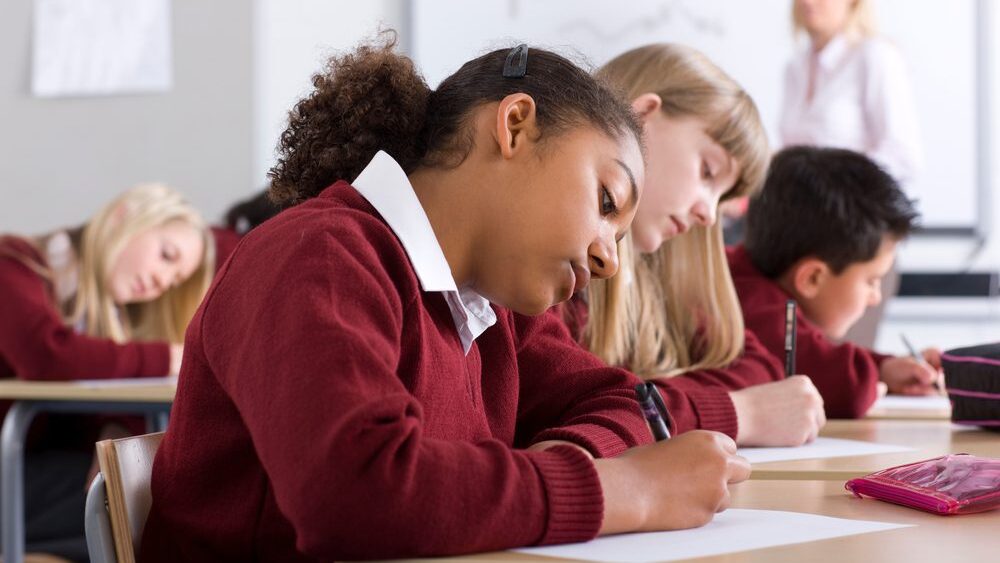
France will consider reintroducing uniforms in state schools following a worrying rise in harassment and violence, and the growing number of controversies surrounding the wearing of the Islamic abaya. The measure has received strong support from the French public, as well as from some teachers. A number of schools are to carry out experiments before the scheme is extended.
There are many well-known arguments in favour of the return of uniforms: an end to competition between children over clothing, and the associated bullying; the disappearance of social differences; making life easier for parents; and an end to demands from different religious communities.
The subject of wearing uniforms regularly crops up in French politics, but until now, no education minister has taken the plunge and put it into practice. The return of the uniform was, for example, part of Éric Zemmour’s programme, but he believes that it should be “imposed” rather than “experimented with.” Les Républicains party chairman Éric Ciotti was also in favour. In January, the Rassemblement National put forward a bill to reintroduce uniforms, arguing that they would solve two problems: “Brand competition and pressure from Islamists on children attending school.” The bill was rejected because it was proposed by Marine Le Pen’s party. The President’s wife, Brigitte Macron, explained that she was in favour too. Today, it is someone close to Emmanuel Macron who has decided to break the taboo and support the wearing of uniforms.
Uniforms are to be introduced on an experimental basis. The trial is scheduled to last two years. Only primary schools and upper and lower secondary schools may take part, not nursery schools. Once a school has volunteered, all classes will wear uniforms, both inside the school and “during any teaching-related activity that takes place outside the school premises.” The decision will have to be voted on by the board of governors, and the wearing of uniforms will be included in the school’s internal regulations.
No single model of uniform will be imposed. The composition of the kit will be determined “locally” and “on a case-by-case basis,” taking into account any specific weather conditions in the participating towns. The uniform may, but need not, be embellished with a crest representing the school or be adapted according to the class levels. It need not be a full uniform, but could, for example, include only top pieces. These details are set out in a short guide published by the ministry, which was sent to schools that volunteered at the beginning of December.
The town of Reims is one place which has volunteered to reintroduce uniforms in its schools. The mayor belongs to the Horizons movement, led by former Prime Minister Edouard Philippe, which is part of the presidential majority. He says he is convinced that the uniform is “a building block for a return to values, order and respect at school.” Other towns have also volunteered, such as Nice, led by former Les Républicains Christian Estrosi, who has since joined Emmanuel Macron, and Perpignan, whose mayor is a historic figure from the Rassemblement National, Louis Aliot.
In both Reims and Perpignan, the uniform is due to be introduced from spring 2024. The other municipalities will join the movement at the start of the 2024 school year. The mayor of Reims, Arnaud Robinet, appreciates the method used by Gabriel Attal, which is based on experimentation and proposals, in contrast to the authoritarian and Jacobin habits usually found in the Ministry of Education: “For once, the State is experimenting and proposing that local authorities experiment, and that’s very good. Nothing is imposed. It’s a good thing, because we’ll be able to choose the number of schools.” The mayor of Reims intends to propose the experiment to a representative panel of schools to truly measure its effects, both in city centre schools and in schools in outlying areas deemed to be ‘difficult.’
The return of the uniform is a measure that is generally very well received in France. A survey carried out by CNews in early 2023 showed that six out of ten French people were in favour. Left-wing teachers’ unions, on the other hand, are hostile. The Café Pédagogique platform, frequented by many teachers, relays these negative opinions. It gives the floor to historian Claude Lelièvre, for whom it is above all a question of “agit-prop” and “ideology.” He accuses the uniform of being a “socio-cultural” marker, intended for the “most exclusive” establishments.
The young minister of education, Gabriel Attal, who is one of Emmanuel Macron’s closest aides, is currently on a roll and in just a few weeks has become the favourite political figure of the French, who have appreciated his firm stance on the abaya issue, or his clear-cut handling of cases of school harassment, where his predecessors gave the impression of not knowing how to show clarity and authority in their actions. Some even see him as a potential successor to Emmanuel Macron.
